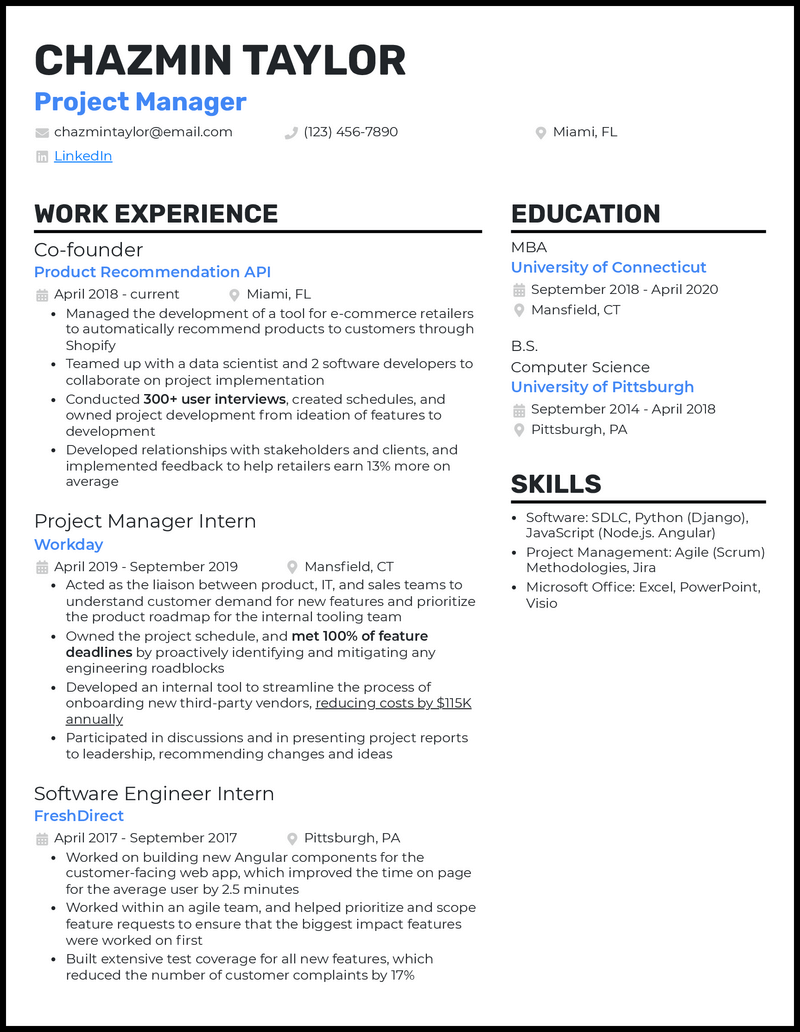Chazmin Taylor looked around her apartment as she prepared to step outside her comfort zone and jumpstart her career. Chazmin knew she could manage teams and forge strong working relationships—both internally and externally. She’d made the most of her previous job and internships, and she craved advancement.
Chazmin eagerly tackled her next steps head-on, MBA in hand alongside an entry-level project manager resume. She wasn’t sure where to start, but luckily a quick search led her to these professional resume examples. After following our advice, Chazmin soon left a successful interview with a start date and a smile!
Maybe you need to get your resume in top shape with a free resume builder to make a go for your dream job, too: We can help you find the best ways to present your skills and take your next career step in no time!
Why this resume works
- Project management is interesting because there’s no one way of describing it. You may just be everywhere at your new job. Know what that means? Time to prove you’re well-versed in various business operations.
- We know it’s asking too much for an entry-level project manager resume and that’s why you’re gonna interest readers with your education more than experience. List down all relevant degrees and courses which can show your knowledge prowess in tech and business simultaneously.
What Matters: Your Skills & Work Experience

When a recruiter is looking at your entry-level PM resume, they’re trying to determine two things:
- Do you have the right technical skills to do the job?
- Do you have the capacity to learn on the job to ultimately be an effective project manager?
The first question is answered through the skills section on your resume.
Now, you’re not going to get an interview just because you have a good skills section. But you can lose a potential interview if this section isn’t done correctly.
How do you do this? By reading the project manager job description! For example, if you’re applying for a technical project manager role focused on a Python tech stack, you’ll want to have Python on your resume.
9 most popular entry-level project manager skills
- Data analysis
- Agile methodologies
- Budgeting
- Tableau
- Microsoft Excel
- SQL
- Statistics
- Project planning
- KPI reporting
Example entry-level project manager work experience bullet points
Once you pass the recruiter’s preliminary screening with an effective skills section, it’s time for the main course.
Your work experience and projects will determine whether you get an interview. You need to convince the recruiter you have the capacity to become an effective project manager.
You do that by focusing on the measurable impact of the projects you’ve managed in the past. Now, these don’t have to be projects directly related to project management.
Did you oversee a group project in school? Work to improve some operation in a part-time job you held? Manage a research group to answer a question?
Here are a few samples:
- Managed the process of improving the check-out system at a local pizzeria ultimately reducing check-out time by over 40%
- Conducted user interviews to identify complaints of student dorms and then presented findings to school administrators, leading to an improvement in student reviews of 17%
- Worked closely with a team of software engineers to create easy-to-use signup forms for clubs on campus resulting in 20% more signups
- Identified biggest sources of inefficiency in the customer onboarding flow and then worked with developers and product managers to iteratively improve this flow, improving trial to paid signup rate by 10%
Top 5 Tips for Your Entry-Level Project Manager Resume
- Any role can be made relevant
- When you don’t have much relevant experience in project management, you need to frame your other experiences (and projects) to convince a recruiter you can do the job. Focus on processes you improved in part-time jobs or group projects you managed in class, for example.
- Quantify your project’s impact
- As a project manager, you need to focus on metrics. What metrics are you trying to improve with a given project? To demonstrate you know the importance of metrics, include your impact (in numbers) on your resume. Did you improve a process? How much time did it save? Did you oversee a group project? What was the outcome of that project?
- Put your strongest assets center stage
- As an entry-level PM, your education and/or certifications may be your biggest strengths. That’s okay! Just make sure to put them at center stage. Break them out into their own sections on your resume, and talk about things like classes you took that are relevant to the role you’re applying for.
- Focus on your technical skills
- I’ve seen a lot of resumes. Never have I seen a soft skill in the “skills” section and been convinced of anything. What does “detail-oriented” mean without context anyway? As such, focus your skills section on your technical, objective skills. Things like Excel, Google Analytics, and budgeting are good examples.
- Demonstrate your ability to learn
- No one expects you to be an expert project manager when starting your career. Instead, you’re being hired for your potential to become an effective PM. To do that, you will need to learn on the job. Convince the recruiter you seek out new skills by showcasing what and how you’ve learned some of the skills that will make you a great project manager.
Keep it to one page. Under no circumstances should an entry-level resume extend to two pages. You don’t need to add content just to hit one page, though. Recruiters can read right through fluff on your resume!
The essentials for an entry-level PM are contact info, skills, education, and work experience. Optionally, choose a resume template that lets you include a projects and hobbies/interests section. Avoid a career objective unless you’ll take the time to customize it for each job you apply to.
Your resume should focus on your impact. For example, “improved process saving $X in costs.” Writing a cover letter gives you the place to flesh this out more. What was the driver for the cost reduction? How did you go about figuring out the solution?










